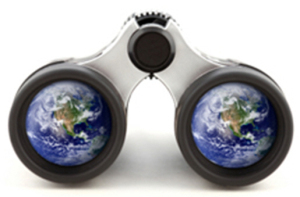How does your worldview influence your writing?
When you read a hard-as-nails police or espionage novel, do you wonder about the worldview of the author? Do you assume s/he’s politically conservative, possibly career law enforcement or military, and/or heavily interested in weapons, military strategy, law and order issues and personal and national security?
When you read a novel about people coming of age, discovering themselves in hero’s journey styled stories, or finding love among the ruins, do you wonder if the author is writing out of his or her own philosophy of life and “the big picture”? Do you assume s/he is politically liberal, possibly a teacher or a psychologist, and/or heavily interested in social programs, personal and religious freedom and a lifetime of learning?
I’m not sure we should make these assumptions. If we do, we might be surprised how often an author writes “against typecasting.”
 On the other hand, many of us write short stories and novels that are heavily influenced by our “philosophy of life” or our view of the universe and an individual’s place within it. When I read a page-turning espionage novel and marvel at the author’s knowledge of weapons and tactics, I see quite clearly that I could never write such a book. I have no experience with military weapons and have never been drawn to study them, much less to form a clear picture about their technical differences or what it would be like to use them in a real world situation.
On the other hand, many of us write short stories and novels that are heavily influenced by our “philosophy of life” or our view of the universe and an individual’s place within it. When I read a page-turning espionage novel and marvel at the author’s knowledge of weapons and tactics, I see quite clearly that I could never write such a book. I have no experience with military weapons and have never been drawn to study them, much less to form a clear picture about their technical differences or what it would be like to use them in a real world situation.
On the other hand, when I read a magical realism novel I assume that the author has an affinity for the magic and the stories generally associated with the time and place in which the story is set. A good researcher can find out what myths and legends might apply to a town or a region. But blending those into a story probably requires a sense of magic just as a spy novel often requires its author to have a sense of weapons and combat situations.
Perhaps somebody has written a doctoral dissertation or a definitive book about stories and the authors who tell them. Perhaps there’s research out there that shows the connections (or lack of connections) between authors’ books and authors’ political/philosophical/religious beliefs.
Personally, I see writing within–or somewhat within–one’s worldview as another way of writing what you know. Expediently, it’s a practical approach because in general terms, our worldview is our comfort zone. We know more about how situations within that view might unfold and how characters embracing our attacking that worldview might develop, react and think. Some (perhaps many) authors might refute this idea by showing how they have been a chameleon–so to speak–by writing books that contrast so greatly with each other that readers could only conclude that they have no worldview at all, have multiple worldviews, or changed their worldviews over time.
That said, perhaps my musings on this subject boil down to this opinion: If you’re an emerging writer, writing from within your worldview gives you a greater chance of “getting it right” than writing about characters and events you don’t grok in your daily life.
That’s my experience. What’s your experience?
–Malcolm
Malcolm R. Campbell is the author of fantasy (“The Sun Singer,” “Sarabande”), paranormal (“Moonlight and Ghosts,” “Cora’s Crossing), and magical realism (“Conjure Woman’s Cat,” “Emily’s Stories,” “Willing Spirits”) novels and stories.





